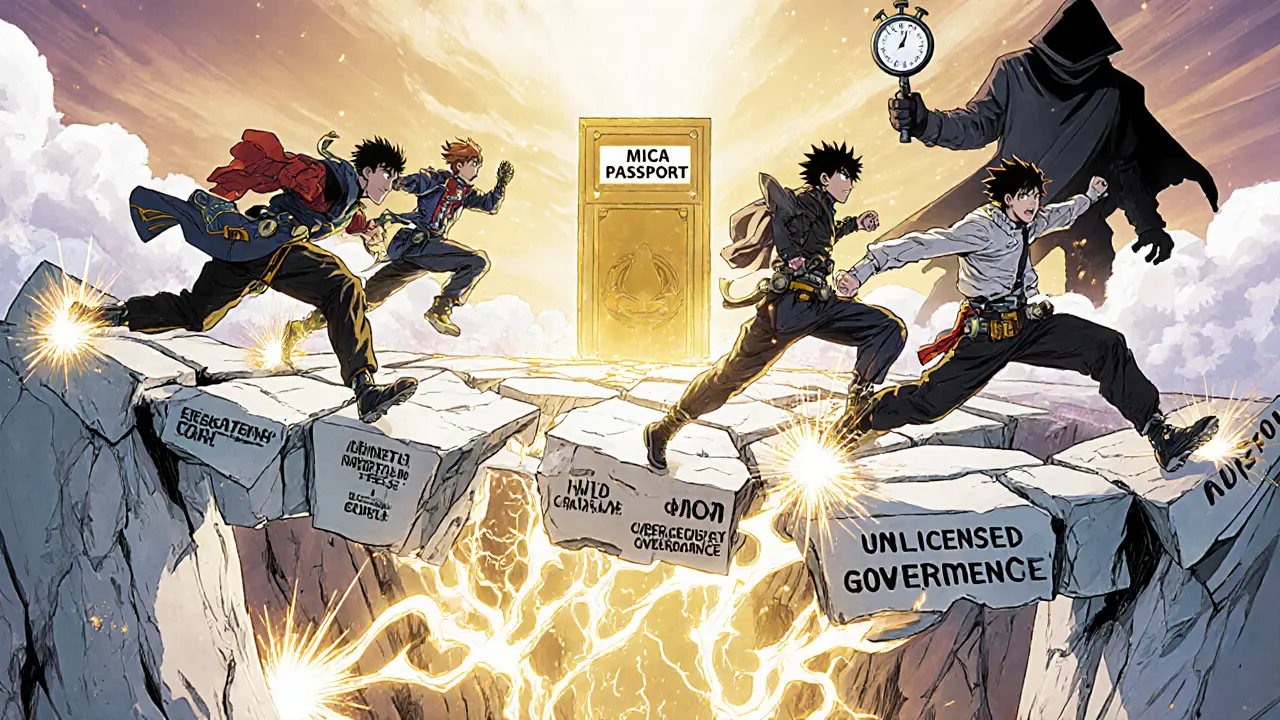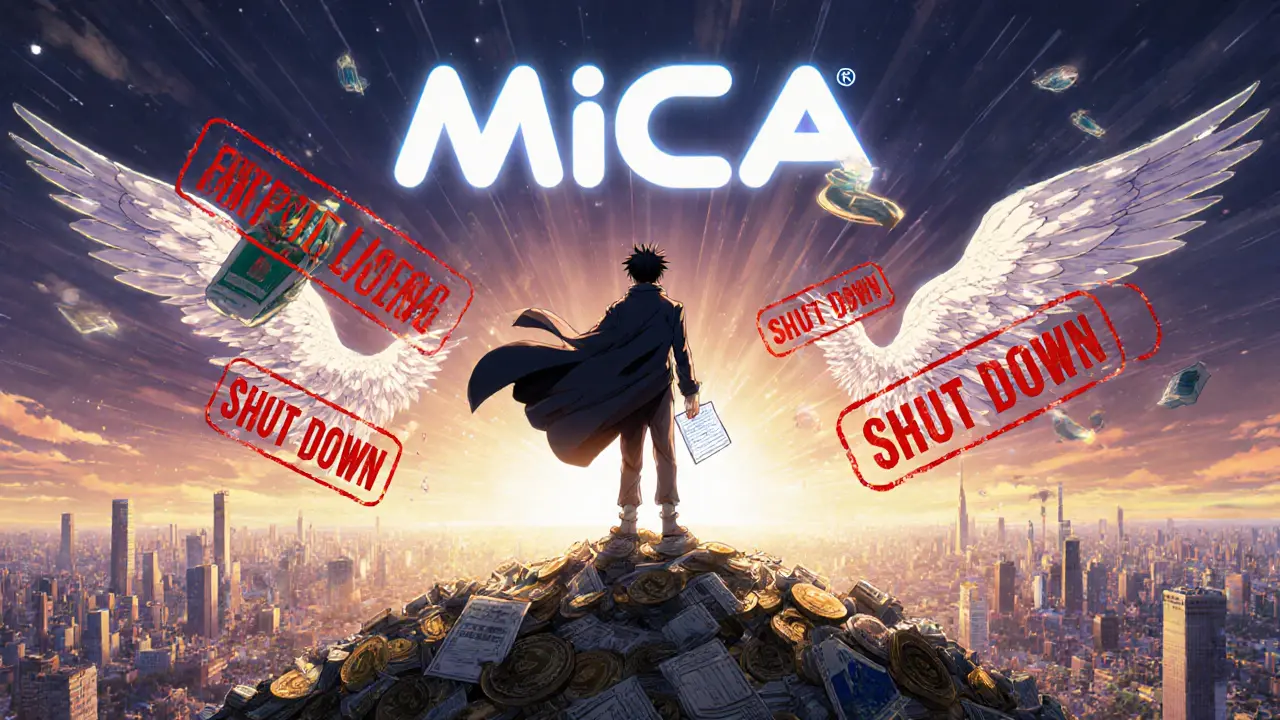On December 30, 2024, the EU’s MiCA regulation officially kicked in. For crypto businesses operating in Europe, this wasn’t just another update-it was a full reset. Suddenly, the patchwork of national rules vanished. In their place came one unified system: the Markets in Crypto-Assets Regulation. But here’s the catch: not everyone had to be ready on day one. A transition period was built in. And that’s where things get messy.
What MiCA Actually Changes for Crypto Businesses
Before MiCA, a crypto exchange in Germany could operate under different rules than one in Spain. That’s gone. MiCA now sets the same baseline for every crypto-asset service provider (CASPs) across all 27 EU countries and the EEA. That includes exchanges, wallet providers, custodians, and issuers of tokens like stablecoins and asset-referenced tokens. The regulation doesn’t just say "be careful." It demands proof. Companies must show they have:- Clear corporate governance structures
- Competent management teams
- Enough capital to cover risks
- Strong cybersecurity and data protection systems
- Transparent advertising and customer disclosures
- Systems to manage conflicts of interest
Transition Periods Vary by Country-Here’s What’s Real
MiCA gives member states flexibility. They can grant transition periods of up to 18 months for firms already operating under national rules. But not everyone chose the full 18 months. The result? A confusing patchwork of deadlines.- Czech Republic, Belgium, Poland: Transition lasts until July 1, 2026. Applications must be submitted by July 31, 2025.
- Lithuania: Transition ends January 1, 2026.
- Finland: Deadline was June 30, 2025. Only seven applications were received. If you didn’t apply by then, you’re already out of compliance.
- Netherlands, Slovenia, Hungary, Latvia, Finland: Mid-2025 deadlines, mostly between April and June.
- Norway (EEA): Transition ends December 30, 2025.
Why Cross-Border Operations Are a Minefield
Let’s say you’re a crypto exchange based in Poland, with clients in Finland and Germany. Poland lets you operate until July 1, 2026. Finland’s deadline was June 30, 2025. Germany’s is October 31, 2025. Under MiCA, you can’t ignore Finland. Even if you’re licensed in Poland, you’re still providing services to Finnish customers. That means you must be fully authorized under MiCA by June 30, 2025-or stop serving them. If you don’t, you’re breaking EU law. ESMA made this clear: National regulators must monitor cross-border activity and coordinate to prevent service disruptions. This isn’t theoretical. A business in Germany might think it’s safe because its transition lasts until October 2025. But if it’s offering services to clients in Slovenia, where the deadline was May 2025, it’s already in violation. No exceptions. No grace periods for "I didn’t know."
Grandfathering Doesn’t Mean Full Access
Many crypto firms assumed that if they were already registered under national rules, they could keep going under MiCA without a full license. That’s a dangerous myth. Grandfathering lets you operate temporarily while you apply. But it doesn’t give you the key benefit of MiCA: passporting. Passporting means once you’re authorized in one EU country, you can offer services across the entire bloc without reapplying. That’s the whole point of MiCA-it removes barriers. If you’re grandfathered, you’re stuck. You can’t expand into other EU countries. You can’t offer services under the MiCA label. You’re still operating under old, national rules, and you’re vulnerable to sudden shutdowns if your application gets rejected. The Netherlands and Germany issued their first MiCA licenses on December 30, 2024. By mid-2025, over 40 licenses had been granted. These companies now have passporting rights. The rest? They’re on borrowed time.What Happens When the Clock Runs Out
If you haven’t applied for a MiCA license by your country’s deadline, you lose the right to operate. No warning. No extension. The regulator shuts you down. Finland’s example is telling. The Financial Supervisory Authority (FIN-FSA) received exactly seven applications by the June 30, 2025 deadline. That’s it. No more. If you were registered under the old national law and didn’t apply, your service is no longer legal. Period. Even if you applied, you’re not safe until you get approval. Some applications are still under review. If the regulator finds gaps in your governance, capital, or security systems, they can deny your license. And if that happens, you have to stop immediately.
What Should You Do Now?
If you’re a crypto business operating in the EU, here’s what you need to do right now:- Confirm your country’s transition deadline. Don’t assume it’s the same as others.
- If you serve customers in multiple countries, use the earliest deadline as your hard stop.
- If you haven’t applied for a MiCA license yet, you’re already behind. Move fast.
- Review your compliance systems. Do you have documented governance? Proven management competence? Adequate capital buffers? Cybersecurity audits?
- Don’t rely on grandfathering as a long-term strategy. It’s a bridge, not a destination.
What’s Next for Crypto in the EU?
MiCA isn’t the end. It’s the beginning. By 2026, the EU will have a fully functioning, unified crypto market. The first licensed CASPs are already expanding into new countries. They’re attracting institutional investors. They’re building trust. Meanwhile, unlicensed operators are being forced out. The market is cleaning up. And the companies that survive will be the ones that treated MiCA not as a burden-but as a competitive advantage. If you’re still operating under old rules, you’re not just risking fines. You’re risking your entire business.What happens if my crypto business misses the MiCA transition deadline?
If you miss your country’s deadline, your right to operate as a crypto-asset service provider ends immediately. National regulators will shut down your services, and you may face fines or legal action. You cannot legally serve EU clients until you obtain full MiCA authorization, even if you applied late.
Can I keep operating if I applied for a MiCA license but haven’t been approved yet?
Only if you’re still within your country’s transition period and were registered under national rules before December 30, 2024. Once the deadline passes, even if you’ve applied, you lose legal permission to operate until your license is granted. There’s no automatic extension for pending applications.
Do I need a MiCA license if I only serve non-EU customers?
No, MiCA only applies if you offer services to customers located in the EU or EEA. If your business operates entirely outside the EU-no clients, no offices, no marketing targeted at Europeans-you’re not subject to MiCA. But if even one EU customer accesses your platform, you fall under its scope.
What’s the difference between a grandfathered firm and a fully licensed CASP?
A grandfathered firm can operate temporarily under old national rules while applying for a MiCA license. But it cannot offer services across the EU under MiCA’s passporting system. A fully licensed CASP has been approved under MiCA and can legally serve customers in any EU or EEA country with one authorization.
Which countries are issuing MiCA licenses the fastest?
The Netherlands and Malta issued the first licenses on December 30, 2024. Germany followed quickly in January 2025. By mid-2025, over 40 licenses had been granted, with the majority coming from the Netherlands and Germany. These countries have streamlined processes and experienced regulators, making them top choices for new applicants.
Does MiCA apply to decentralized exchanges (DEXs)?
MiCA currently targets centralized service providers-exchanges, custodians, brokers-that act as intermediaries. Decentralized exchanges (DEXs) without a legal entity or operator are not directly regulated under MiCA. However, if a DEX has a company behind it that manages smart contracts or collects fees, that entity may be classified as a CASP and require a license.









Comments (25)
Evan Koehne
November 3, 2025 AT 07:22 AMSo let me get this straight - the EU just turned crypto into a bureaucratic obstacle course with a 18-month grace period that varies by country like a bad game of musical chairs? And the only winners are the lawyers who get paid to decode this mess? I mean, if I wanted to read a 500-page manual before I could buy a meme coin, I’d just stick to Monopoly money.
At this point, MiCA feels less like regulation and more like a public service announcement for exit scams.
Also, Finland got seven applications? That’s not a compliance rate - that’s a funeral.
Someone’s gotta tell the regulators: if you want innovation, stop building velvet ropes around the sandbox.
Vipul dhingra
November 4, 2025 AT 20:57 PMPeople keep acting like MiCA is some kind of breakthrough but it's just the same old centralized control dressed up in fancy EU jargon
crypto was supposed to be about freedom from banks and governments and now we're all begging for licenses like we're applying for a driver's permit to use bitcoin
the real problem is not the deadlines it's the mindset that someone needs to approve your right to build a wallet
you think this will stop criminals no it just pushes them to the dark web where no one cares about your corporate governance structure
the only thing MiCA achieves is making small devs give up and big firms buy their way in
and then we call it progress
Jacque Hustead
November 5, 2025 AT 10:59 AMI appreciate how detailed this breakdown is - especially the country-by-country deadlines. It’s easy to feel overwhelmed when you’re trying to navigate this, but seeing it laid out like this makes it manageable.
For anyone still unsure where they stand, I’d recommend reaching out to your local financial authority. They’re required to provide guidance, even if it’s not always quick.
And if you’re operating cross-border, don’t guess - document everything. Even if your home country gives you more time, if you serve users in a country with an earlier deadline, that’s your real cutoff.
This isn’t about fear. It’s about clarity. And clarity is the first step to building something sustainable.
Robert Bailey
November 6, 2025 AT 05:42 AMMan I just read this and thought wow this is actually super helpful
so many people are panicking but if you just take it step by step it’s doable
check your country deadline first
if you serve people in multiple places use the earliest one
if you haven’t applied yet don’t panic just start gathering your docs today
the regulators aren’t out to get you they just want you to be safe and transparent
and honestly that’s not a bad thing
we’ve all seen too many crypto projects vanish overnight
if you’re building something real MiCA is your ticket to being taken seriously
no more whispers in the dark just legit business
you got this
Wendy Pickard
November 6, 2025 AT 21:01 PMIt’s interesting how much emotional weight people are putting on this regulation. For some, it’s a threat. For others, a lifeline.
I think the real story here isn’t the deadlines - it’s the shift in mindset. For years, crypto operated in a gray zone. Now there’s light.
Yes, it’s complicated. Yes, it’s frustrating. But if you’re building something that serves real people, this structure gives you credibility. And credibility attracts real customers, real partners, real investment.
It’s not perfect. But it’s progress. And progress is worth showing up for.
Jeana Albert
November 8, 2025 AT 19:21 PMOH MY GOD I CAN’T BELIEVE PEOPLE ARE STILL WAITING TO APPLY
YOU’RE ALREADY DEAD IF YOU’RE IN FINLAND
AND YOU THINK YOU’RE SAFE BECAUSE YOU’RE IN POLAND BUT YOU’RE SERVING FINNISH USERS??
THEY’RE COMING FOR YOU
THEY’RE ALREADY SHUTTING DOWN BUSINESSES
AND YOU’RE STILL SITTING THERE THINKING ‘I’LL DO IT TOMORROW’
WHAT IS WRONG WITH YOU
THIS ISN’T A GAME
YOUR BUSINESS IS ON THE LINE
YOUR CUSTOMERS ARE AT RISK
AND YOU’RE SCROLLING THROUGH MEMES LIKE THIS IS JUST ANOTHER BULL RUN
GET YOUR SHIT TOGETHER OR GET OUT
NO ONE CARES ABOUT YOUR EXCUSES
THE REGULATORS DON’T HAVE TIME FOR YOUR DELUSIONS
Natalie Nanee
November 10, 2025 AT 05:40 AMIt’s so irresponsible how many people are still operating under the assumption that ‘if I don’t get caught, it’s fine.’
Let me be clear - this isn’t about punishment. It’s about protection. Consumers need to know their funds are safe. They need to know the company behind the app isn’t a shell with a Discord admin and a GitHub repo.
And if you’re one of those people who thinks regulation kills innovation - you’re wrong. It kills fraud. And fraud is the real innovation killer.
Stop romanticizing chaos. Real builders welcome structure.
And if you’re still waiting for someone else to fix this for you? You never should’ve started.
Angie McRoberts
November 12, 2025 AT 04:36 AMSo I read this whole thing and honestly? It’s kind of a relief.
There’s so much noise around crypto regulation - fearmongering, hype, doomscrolling - but this just lays out the facts without drama.
And honestly? The fact that some countries moved fast (Finland) while others gave breathing room (Poland) shows this isn’t one-size-fits-all. That’s actually smart.
It’s not about being ‘pro’ or ‘anti’ regulation. It’s about recognizing that when you handle other people’s money, you owe them more than a whitepaper and a Telegram group.
So if you’re still on the fence? Take a breath. Make a checklist. Talk to someone who’s been through it.
You don’t have to be perfect. You just have to show up.
Chris Hollis
November 13, 2025 AT 11:25 AMGrandfathering is a scam
passporting is the only thing that matters
everyone else is just delaying the inevitable
the fact that 15 countries went under 18 months proves they knew this was coming
and the ones dragging their feet? They’re already irrelevant
the only people who care about your ‘transition period’ are the ones who never planned to comply
stop pretending you’re a startup
you’re a liability with a website
Diana Smarandache
November 13, 2025 AT 18:36 PMThe regulatory landscape under MiCA represents a foundational shift in the governance of digital asset services within the European Economic Area. It is imperative that all market participants recognize that compliance is not optional, nor is it a technicality.
Failure to adhere to established deadlines constitutes a material breach of legal obligation, and regulatory authorities are fully empowered to enforce sanctions without notice.
Moreover, the principle of cross-border service provision is unequivocally governed by the most restrictive applicable jurisdiction - a principle grounded in both legal precedent and consumer protection imperatives.
Entities that continue to operate under outdated national frameworks do so at their own peril, and any expectation of leniency is both legally unfounded and ethically indefensible.
Compliance is not a burden - it is the price of legitimacy.
Allison Doumith
November 13, 2025 AT 22:06 PMyou know what’s wild about all this
we spent years saying blockchain is decentralized
but now we’re all begging the EU for permission slips
like it’s 1999 and we’re asking mom if we can get a dial-up modem
the irony is thick enough to spread on toast
and don’t even get me started on the fact that the same people who screamed ‘censorship!’ when PayPal froze accounts are now lining up to beg for a MiCA stamp
we didn’t fight for decentralization we fought for anonymity
and now we’re handing over our KYC docs like it’s a school photo
and calling it progress
what a time to be alive
send help or just a meme
Scot Henry
November 15, 2025 AT 17:54 PMman i just realized i’ve been thinking about this all wrong
it’s not about if you can get licensed
it’s about whether you’re building something people actually trust
the whole point of crypto was cutting out the middleman
but now the middleman is the regulator and honestly
if your business can’t survive that
maybe it shouldn’t have existed in the first place
just saying
also i misspelled ‘regulator’ just now
but you know what i meant
Sunidhi Arakere
November 16, 2025 AT 17:30 PMThis is very clear and well-structured. Many people in India are watching EU regulations closely because they are looking to expand. The deadlines are strict, but the rules are fair. If a business is serious, it will follow them. If not, it will fail. Simple as that.
Also, the point about cross-border operations is important. Many small teams think they can ignore one country’s rules because they are based elsewhere. That is dangerous. Compliance is not optional.
Vivian Efthimiopoulou
November 17, 2025 AT 16:59 PMLet us pause for a moment - not to celebrate, not to condemn - but to reflect.
What is the soul of cryptocurrency? Is it the wild, unregulated frontier? Or is it the promise of financial sovereignty - a system where individuals, not institutions, control their wealth?
MiCA does not kill that promise. It refines it.
The chaos of the past - the rug pulls, the exit scams, the shell companies masquerading as exchanges - those were not features. They were failures.
Now, for the first time, we have a framework where innovation can coexist with integrity. Where a small team in Lisbon can compete with a giant in Frankfurt - not because they have more capital, but because they have better governance.
This is not the end of crypto.
This is its coming of age.
Angie Martin-Schwarze
November 18, 2025 AT 17:47 PMi just got an email from my bank saying they’re freezing my crypto-related transactions because ‘the regulatory environment is uncertain’
and i’m like… wait i thought mica was supposed to fix this
but now even my bank is scared
and i’m sitting here with my wallet full of tokens and no one to spend them with
because no exchange wants to touch me unless they have a mica license
and i don’t even know if mine will get approved
and i’m just… crying
not because i’m broke
but because i believed in this
and now i feel like i’m the only one who still does
help
Fred Kärblane
November 18, 2025 AT 20:41 PMLet’s talk about the real win here: passporting.
Before MiCA, you had to apply for licenses in every country you wanted to serve. Now? One authorization, full EU access.
That’s a game-changer for scaling. It turns a fragmented market into a unified one.
Yes, the compliance bar is high. But that’s the point. It filters out the fluff.
Now you’ve got real teams with real audits, real capital, real ops - not just devs with a Discord server and a whitepaper.
This isn’t regulation killing crypto.
This is crypto maturing.
And the ones who adapt? They’re gonna own the next decade.
Janna Preston
November 20, 2025 AT 01:44 AMWait so if I’m based in Germany but have users in Slovenia, I have to be licensed by May 2025 even though my own deadline is October? That’s wild.
So the country where I’m headquartered doesn’t matter - it’s where my customers are?
Is that how it works for everything? Like if I run a blog and someone in Finland reads it, do I need a Finnish license?
Just trying to understand the scope here. This feels like a big leap.
Meagan Wristen
November 21, 2025 AT 09:20 AMI’ve been in crypto since 2017 and I’ve seen it all - the hype, the crashes, the betrayals.
But this? This feels different.
Not because it’s perfect - it’s not.
But because for the first time, there’s a real chance that the industry can earn back trust.
It’s not about being ‘regulated’ - it’s about being responsible.
To our users.
To our communities.
To the future.
So if you’re reading this and you’re scared? I get it.
But don’t run.
Build.
And do it right.
Becca Robins
November 22, 2025 AT 14:37 PMso like… mica is just the eu saying ‘you can’t do crypto unless you have a corporate structure and a lawyer’
and i’m like… ok but what if i just want to trade pepe coins with my homies
do i need to file a 50 page compliance report for that?
also why is everyone acting like this is a good thing
we used to be rebels now we’re just… accountants with crypto wallets
also i typed ‘licnese’ by accident but you know what i meant
and also 🤡
Alexa Huffman
November 23, 2025 AT 11:54 AMThis is one of the clearest explanations of MiCA I’ve read. The breakdown of country deadlines and the cross-border implications are critical for anyone running a service across borders.
It’s easy to get lost in the legal jargon, but this cuts through it.
Thanks for putting in the work to make this digestible.
And for anyone still hesitating - you’re not behind. You’re just getting started. Take one step today.
gerald buddiman
November 25, 2025 AT 08:30 AMOkay, I just spent 3 hours reading through this, checking my country’s deadline, and realizing… I didn’t apply.
I thought I had until next year.
I didn’t realize serving users in Finland meant I had to comply with THEIR deadline.
I’m panicking.
But… I’m also motivated.
So I’m calling my compliance consultant tomorrow.
And I’m going to get this done.
Not because I’m scared of fines.
But because I care about the people who use my service.
And I owe them more than excuses.
Arjun Ullas
November 25, 2025 AT 20:30 PMIt is imperative to understand that MiCA is not merely a regulatory framework - it is a paradigm shift in the governance of digital asset markets. The European Union has established a comprehensive, harmonized regime that supersedes all prior national legislation. The transition periods are not loopholes; they are grace intervals for orderly compliance.
Entities that fail to secure authorization by the earliest applicable deadline are in material breach of Union law. Cross-border operations are governed by the principle of the lowest common denominator - jurisdictional arbitrage is not permitted.
Passporting rights are the cornerstone of MiCA’s value proposition. Grandfathering is a temporary accommodation, not a permanent status.
Regulatory authorities are fully operational. Enforcement actions are underway. The time for deliberation has ended.
Compliance is non-negotiable.
Jacque Hustead
November 25, 2025 AT 23:10 PMReading through these comments, I’m struck by how much emotion is tied to this. Fear, anger, hope - it’s all here.
But the most important thing to remember is this: regulation doesn’t erase innovation. It channels it.
The companies that thrive under MiCA won’t be the ones who fought it.
They’ll be the ones who saw it as a chance to build something better.
And that’s worth showing up for.
Fred Kärblane
November 26, 2025 AT 14:57 PMExactly. The real winners aren’t the ones who got licensed first.
They’re the ones who used MiCA to build systems that actually work - for users, for investors, for regulators.
That’s the future.
And it’s already here.
Evan Koehne
November 28, 2025 AT 06:17 AMOne sentence: If the EU wanted to kill crypto, they’d have banned it. They didn’t. They just made it adult-sized.